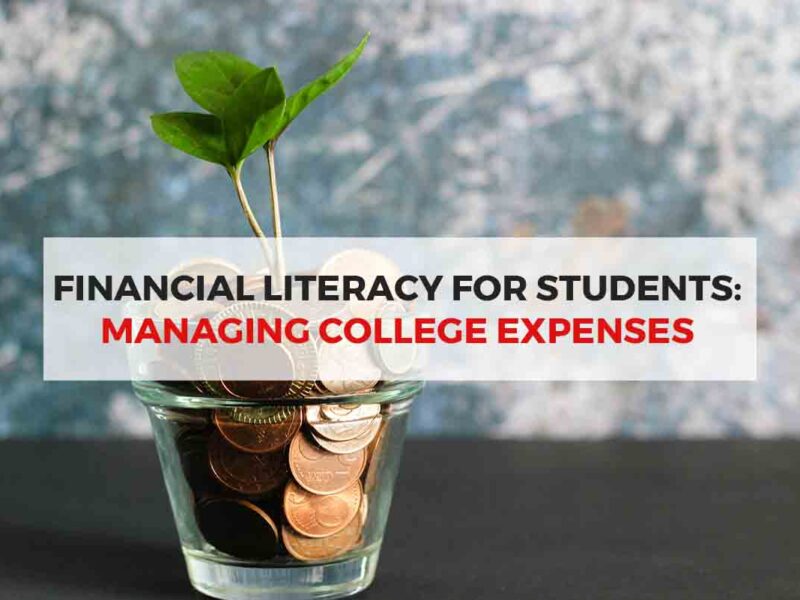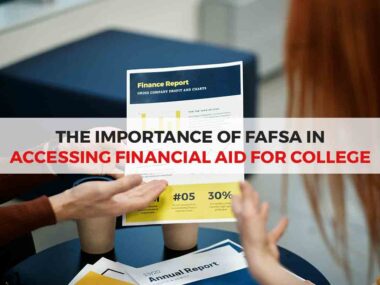Entering college is an exciting and transformative experience, but it also marks the beginning of newfound financial independence for many students. With tuition fees, living expenses, and other miscellaneous costs, managing finances during college can be challenging. In this article, we will explore essential financial literacy concepts for students, focusing on budgeting basics, part-time work and internships, and tips for minimizing student loan debt.
Financial Literacy for Students: Managing College Expenses
- Budgeting Basics for College Students:
Creating a budget is the cornerstone of financial literacy, helping students track their income and expenses. Here are some key steps to master budgeting:
- Identify Income Sources: Understand where your money is coming from, whether it’s from part-time work, internships, scholarships, or parental support.
- Track Expenses: Record all your expenses, including tuition, housing, utilities, food, transportation, and entertainment. Utilize budgeting apps or spreadsheets to maintain a clear overview.
- Prioritize Needs Over Wants: Distinguish between essential expenses and discretionary spending. Prioritize needs like tuition, rent, and groceries over non-essential purchases.
- Emergency Fund: Allocate a portion of your budget to an emergency fund. Having a financial cushion can help you navigate unexpected expenses without derailing your entire budget.
- Review and Adjust: Regularly review your budget to ensure you’re staying on track. Adjustments may be necessary as circumstances change.
Exploring Part-Time Work and Internship Opportunities:
- Balancing Act: While academics are a priority, part-time work or internships provide valuable real-world experience and additional income. Strike a balance that allows you to excel academically without overwhelming yourself.
- Internships: Seek internships related to your field of study. Not only do they enhance your resume, but some internships also offer financial compensation or academic credit.
- Networking: Use part-time work and internships as opportunities to build a professional network. Networking can open doors to future employment opportunities and mentorship.
- Time Management: Efficiently manage your time to accommodate both academic commitments and work responsibilities. Effective time management is crucial for success in both areas.
Tips for Minimizing Student Loan Debt:
- Scholarships and Grants: Actively search for scholarships and grants. Many organizations, both private and public, offer financial aid based on academic achievements, talents, or other criteria.
- Work-Study Programs: Explore work-study programs on campus. These programs provide part-time employment for students with financial need, allowing them to earn money and gain work experience.
- Minimize Borrowing: Only borrow what you truly need. Avoid taking out excessive loans for non-essential expenses, as it can lead to a heavier financial burden upon graduation.
- Understand Loan Terms: Before taking out a loan, thoroughly understand the terms and conditions. Be aware of interest rates, repayment plans, and any potential grace periods after graduation.
What is Financial Literacy for Students?
Financial literacy for students refers to the ability to understand and manage one’s finances effectively. It involves acquiring knowledge and skills related to budgeting, saving, investing, and making informed financial decisions. Students with financial literacy are equipped to navigate the challenges of managing money during their academic years and beyond.
How Do You Teach Students About Financial Literacy?
Teaching financial literacy to students involves a combination of classroom education, practical exercises, and real-world experiences. Key methods include:
Classroom Instruction: Integrate financial literacy into the curriculum with dedicated courses or modules covering budgeting, saving, investing, and debt management.
Hands-On Activities: Engage students in practical exercises such as creating budgets, tracking expenses, and simulating real-life financial scenarios to enhance their understanding.
Guest Speakers: Invite financial experts or professionals to share insights and practical tips on managing finances. Real-world experiences provide valuable perspectives.
Interactive Workshops: Conduct workshops that encourage active participation, discussion, and problem-solving related to financial challenges students may encounter.
Relationship Between Financial Literacy and Budgeting
Budgeting is a fundamental component of financial literacy. It involves planning and allocating resources to meet financial goals. Financial literacy provides the knowledge and skills necessary for effective budgeting, helping students understand income sources, track expenses, and make informed decisions about spending and saving.
Why is Money Management Important for Students?
Money management is crucial for several reasons:
Financial Independence: Students transitioning to college experience increased financial independence. Money management skills empower them to make responsible financial decisions and handle their finances autonomously.
Debt Avoidance: Proper money management helps students avoid accumulating unnecessary debt. Understanding the consequences of borrowing and making informed choices minimizes the risk of financial strain in the future.
Future Financial Stability: Developing good money habits early contributes to long-term financial stability. Students who learn effective money management are better equipped to handle financial challenges and achieve their future goals.
Reduced Stress: Financial literacy and effective money management contribute to reduced financial stress. Students who can manage their finances confidently are more likely to focus on their studies and overall well-being.
Conclusion:
Financial literacy is a crucial skill for college students, enabling them to navigate the complexities of managing expenses and building a solid foundation for their financial future. By mastering budgeting, exploring work opportunities, and minimizing student loan debt, students can not only survive but thrive during their college years and beyond.






